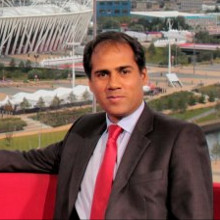I have lost count of the number of times I’ve observed a company with a pile of cash doing nothing more than earning a pittance with it stuffed in a bank account or two. Many managers do not seem to recognise that their job is to examine all the uses of capital within the business, and ask whether a suitable rate of return is being generated in each.

When it comes to money left in the business by shareholders we expect a rate of return of at least 8% because shareholders money is risk capital.
Admittedly, shareholders may not have actually written a cheque and sent it to the company for the managers to place into a deposit account and so the taking of shareholders’ money is perhaps not so obvious; more likely, the deposited cash has come from retained profits.
Nevertheless, that money is shareholders and they could demand that it be handed over to them to be allocated elsewhere in the stock market to earn at least 8%.
So, when managers persuade shareholders that they should hold back on dividends to place cash into yet another deposit they must justify that by saying they can achieve 8% per annum.
Of course, they can’t, so they come up with other reasoning.
The most popular is the reduction of risk. By having no borrowing and a pile of cash the company is not going to go bust, thus it is good for shareholders, or so goes their logic.
But this is poor thinking. Shareholders are already diversified; from their point of view it doesn’t matter if occasionally one or two portfolio constituents flirts with liquidation because of low cash reserves, just so long as the overall portfolio performs well.
Here’s an example,
Mr S has a portfolio of fifteen shares. We’ll assume Mr S owns 100% of each company’s equity for the sake of simplicity, but the same logic applies with fractions of companies.
The portfolio has a market value of £15m. Each company has net assets of £1m, of which £0.3m is cash (that seems a lot of cash, but I know companies with more than this proportion in cash).
Total annual earnings across the portfolio is £1m pa. Thus, the PER is 15.
Mr S is doing OK, you might say. But he could do much better.
Consider this: each company in the portfolio borrows a modest amount of £0.2m at an annual cost of £0.01m, or £0.15m for the fifteen companies.
Total annual earnings across the portfolio will henceforth be £1m – £0.15m = £0.85m.
Assuming the same PER of 15 applies, the portfolio is worth £0.85m x 15 = £12.75m
But each company now has £0.5m of surplus cash.
If they all pay this out to the shareholder this will be a total of £7.5m
Mr S will have £12.75m in the share portfolio plus £7.5m, a total of £20.25m.
Of course, Mr S might buy shares with that cash, and so has grown his portfolio from £15m to £20.25m.
So why do companies grow cash balances?
A big pile of cash reduces risk for another group of people, other than shareholders. That is the management. Perhaps they choose to have a lot of cash around for that reason??
An excuse often made is along the lines of “We do not see any value-enhancing investments in our existing business at the moment, but something might turn up”.
And they push this same message out to shareholders, year after year, rarely finding good ideas, and so the cash accumulates.
It’s often the case that the original business actually does have very limited room for value creating growth – incremental capital expenditure will not generate good rates of return even though existing capital stock is making good profits.
This has been the case with many of Warren Buffett’s companies. Take See’s Candy. With around 200 stores it is super-profitable, generating very high rates of return on capital employed.
But Buffett prevents the managers adding more stores to try and multiply the profit. This has been attempted a few times in the past and what they found was that they have competitive advantage, some brand recognition and pricing power (share of mind), in only a few places (particularly the West Coast). Elsewhere people are not willing to fork out the premium price. It’s a similar rationale that stops the reproduction of the Nebraska Furniture Mart in dozens of cities around the world, or Borsheims.
What about share investing?
A response I’ve had from directors to the suggestion that they place spare cash in stock market shares is one of shock and horror that I should suggest something so alien.
They say something along the lines of “We are engineers. We can’t do things like invest in the stock market. We would be heavily criticised if shares fell in a reporting year, and besides we don’t know anything about investing in the stock market.”
Shares in such a portfolio are marked to market each year and capital losses are reported through the P&L.
Such losses when they do occur might be much greater than the core businesses profits, so the directors fear that would look really bad – and might even lose their jobs. “No way are we going to do that. We’d rather earn nothing on that cash than risk our careers.”
Charlie Munger’s view
Charles Munger is the dominant director of Daily Journal as well as being Warren Buffett’s business partner at Berkshire Hathaway, and at DJ’s February’s AGM he spelt out his reasoning for it being different to most companies.
He, as Chairman for many decades until 2022, chose neither to hold much cash nor to pay it out to shareholders as special dividends or in share buybacks. Instead he used his expertise in selecting stock market quoted equities – and very successful it has been too:
“It’s all very simple. We made a lot of extra money out of the publishing business in its heyday and that was about $30 million. … in the old days we had an information monopoly on publishing the appellate court’s decisions, daily and newsprint. When the internet came along, it destroyed our position. Our circulation went way down, so we’ve had a drastic change in good fortune in our publishing business.
The future of this business is not in the publishing side, it’s on the Journal Technologies side [supplying technology to court systems around the world]. The good news is that we’re in a huge market because all the courts of the world are in the stone age still in terms of automating with modern technology, so it’s a big market.
The bad news is that it’s a long, slow slog where you deal with a lot of bureaucracies … It’s just a very slow, difficult business. So we’ve got a slow, difficult business of chewing our way [not using a high proportion of the cash generated each year] into a huge market that’s not going away.
The only reason we have a lot of marketable securities is we had the extra money and we preferred the marketable securities to cash in an inflationary world. Of course, it’s been a minor miracle that we’ve got as much as we have in marketable securities because our investments have done better than average. The good news is we’ve survived so far and we’ve got some surplus wealth. The bad news is it’s a long, slow slog ahead and the main future is in Journal Technologies.”
The lesson is: if you have a good capital allocator, able to wisely select a portfolio of shares for a company, then it might be a good idea to retain the portfolio within the business. But if you have no value-enhancing use for cash then pay it out to shareholders, so they can invest that money themselves.
Some Daily Journal data
Back in 2007 the revenue of the operating business was $35m and profits after tax were $5.3m.
Fifteen years later the operating business had grown its revenue a little to $54m, but profits on that was a mere $1.6m, reflecting the headwinds for this type of business.
But over those years Charlie Munger has shifted the cash held by the company into equities, and multiplied it.
So, while in 2007 it had $20m of US government bonds and $1m in cash by September 2022 there was over $200m in marketable securities (after deducting borrowings).
The dividend on these was $5.5m last year. Capital gains are anticipated to be much more than that in future on top of growing dividend income.
This has been excellent capital allocation away from the original business.
Prof Glen Arnold now offers a Managed Portfolio Service at Henry Spain Investment Services under which clients’ portfolios contain the same shares as his (write to Jackie.Tran@henryspain.co.uk)


 Hot Features
Hot Features













